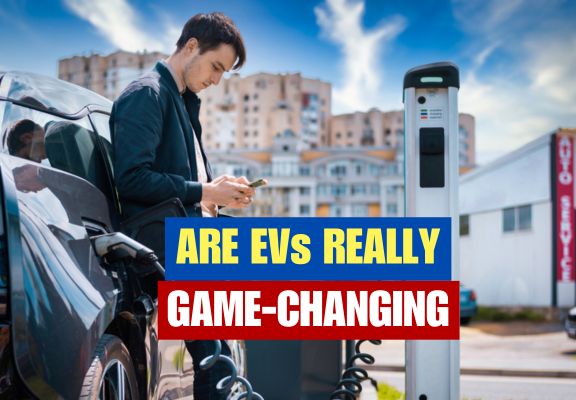Are Electric Vehicles (EVs) Really Game-Changing?


One breakthrough that has been heralded as a game-changer in the automobile industry is electric vehicles (EVs). The promise of zero emissions, cheaper running costs, and a move away from fossil fuels has made electric vehicles (EVs) very popular among consumers and legislators. However, do electric cars actually live up to the hype, or are they just another fad in the world of automobiles? Let’s explore the truth underlying the electric vehicle revolution.
When defending electric vehicles, proponents frequently highlight how much less of an impact they have on the environment and how much less greenhouse gas pollution they produce than cars with conventional internal combustion engines. In fact, since EVs have no tailpipe emissions, the quality of the air can be greatly improved, especially in cities where pollution is a major issue. But EVs have an influence on the environment that goes beyond how they operate.
The source of electricity utilized to charge these vehicles is an important consideration. Even while EVs produce no pollutants when they are in use, in some areas the process of generating power may involve the use of fossil fuels, which calls into question the environmental benefits of electric vehicles. However, the environmental impact of EVs is anticipated to diminish over time, making them a more sustainable mode of transportation as renewable energy sources such as solar and wind power continue to grow.

The potential for cost savings is another argument in favor of electric vehicles. Because electric vehicle are simpler and have fewer moving parts than traditional vehicles, EVs usually have reduced fuel and maintenance expenses. To further lower the initial cost for consumers, governments all over the world provide incentives like tax credits and subsidies to promote the use of electric vehicles.
But there are still issues with electric vehicles accessibility and price. Even though costs have been gradually coming down as a result of technological breakthroughs and economies of scale, electric vehicles are often more expensive up front than their gasoline-powered counterparts. Furthermore, a barrier still exists in the form of charging infrastructure availability, especially in remote or rural places.
Technological innovation is one of the key forces behind the electric vehicle revolution. In particular, battery technology has advanced quickly, improving overall performance, charge times, and energy density. Because of this, contemporary EVs have greater range and quicker charging times, which raises two main worries for prospective purchasers: range anxiety and charging ease.
Additionally, the incorporation of smart features and networking into electric vehicles has opened up new opportunities for enhancing the driving experience. EV makers are using cutting-edge technology to reimagine transportation, from autonomous driving capabilities to over-the-air software updates.

Even while electric vehicles have a lot of potential, it’s important to recognize that they can’t solve every problem the automobile industry is now facing. Coordinated efforts from a number of stakeholders, including governments, automakers, and consumers, will be necessary to make the switch to electric vehicles. To fully utilize EVs, important concerns such as battery recycling, expanding the infrastructure for charging, and grid reliability must be resolved.
Furthermore, obtaining sustainable transportation requires more than just electric vehicles. Prioritizing complementary alternatives like walking, bicycling, and public transportation can help develop more ecologically friendly and accessible mobility systems.
To sum up, electric vehicles have the potential to change the game, but overcoming infrastructure, financial, and technological obstacles will be necessary for them to succeed. It’s critical to keep a balanced viewpoint and keep pushing for innovation and teamwork as we negotiate the switch to electric vehicles in order to shape the direction of mobility in the future.
Even though the path ahead will not be easy, if we are determined and work together, we can push for an environmentally friendly, cleaner, and more sustainable future where electric vehicles will lead the way in transportation innovation.